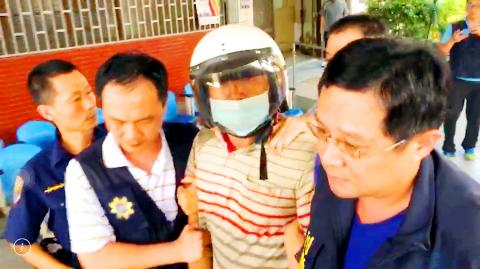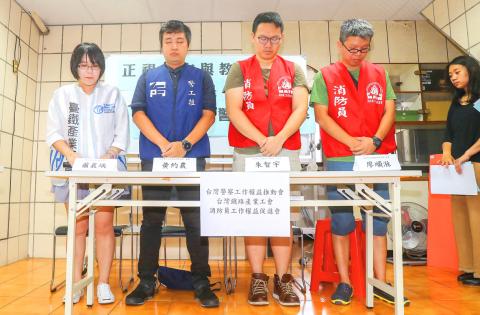Law enforcement agencies and members of the public yesterday expressed condolences and regret over the death of railway police officer Lee Cheng-han (李承翰), who was killed by a knife-wielding passenger surnamed Cheng (鄭) at Chiayi Railway Station.
The incident occurred on a northbound Ziqiang Express (自強號) train on Wednesday, when Cheng, 54, was found to have boarded the train in Tainan without a ticket and refused to pay the full fare, the Taiwan Railways Administration (TRA) said.
The train’s conductor at 8:40pm notified the Railway Police Bureau’s Chiayi Station, which sent Lee to help resolve the dispute, it said.

Photo: Tsai Tsung-hsun, Taipei Times
After refusing to disembark from the train and go to the police station, Cheng produced a knife and stabbed Lee in the abdomen, it added.
Footage of the incident shows Cheng becoming violent and turning to yell at the conductor while Lee grapples with Cheng, who was holding a fruit knife in one hand.
The altercation continues for several minutes and another passenger later joins the brawl, throwing punches to try to dislodge Cheng’s grip on the knife.

Photo: CNA
Despite sustaining a severe wound that left internal organs exposed and caused severe blood loss, Lee continued to fight Cheng, the TRA said.
Cheng was eventually subdued, but Lee was left bleeding profusely from a stab wound and TRA staff carried him out of the train, it said.
He was transported to Chiayi Christian Hospital, where he was pronounced dead at 8:10am yesterday, it added.
A graduate of the Taiwan Police College, Lee was last year recognized by the bureau for extraordinary performance and was to celebrate his 25th birthday on Friday next week.
President Tsai Ing-wen (蔡英文) expressed her deep condolences over Lee’s death.
TRA Director-General Chang Cheng-yuan (張政源) visited Lee’s family immediately after being informed about his death, the agency said, adding that Chang also instructed TRA staff to work with the bureau to arrange Lee’s funeral and seek government compensation.
National Police Agency Director-General Chen Chia-chin (陳家欽) traveled to Chiayi to offer his condolences to Lee’s family, saying that he was filled with sorrow and pain, and promising that changes would be made to better protect police officers and to prevent similar tragedies.
“Lee died in line of duty. His spirit and persistence to uphold his work will always remain in our hearts,” Chen said.
A number of lawmakers issued calls for changes, saying that the policy of having a single police officer on patrol must be abolished and that railway police should have better equipment, such as a riot shield and a stun gun, instead of only a baton while on duty.
Many people hailed Lee as a hero who died courageously while protecting the train’s other passengers.
Chiayi prosecutors said that Cheng faces murder charges, and that they have requested that he be detained.
As Cheng reportedly shouted: “I planned to kill” when he was subdued and taken away by police, the investigation will likely focus on his motive.
In Tainan, investigators yesterday questioned Cheng’s wife, who reportedly broke down in tears and apologized on her husband’s behalf.
She told investigators that Cheng had been feeling financial pressure and was prone to mood swings, adding that he was depressed, but stopped taking medication two years ago.
As Cheng installed and repaired air-conditioners, he always carried two knives, his wife said, but added that he had recently become frustrated and angry due to clients not paying their bills after he completed his work.
Additional reporting by CNA

The Central Election Commission has amended election and recall regulations to require elected office candidates to provide proof that they have no Chinese citizenship, a Cabinet report said. The commission on Oct. 29 last year revised the Measures for the Permission of Family-based Residence, Long-term Residence and Settlement of People from the Mainland Area in the Taiwan Area (大陸地區人民在台灣地區依親居留長期居留或定居許可辦法), the Executive Yuan said in a report it submitted to the legislature for review. The revision requires Chinese citizens applying for permanent residency to submit notarial documents showing that they have lost their Chinese household record and have renounced — or have never

A magnitude 5.6 earthquake struck off the coast of Yilan County at 12:37pm today, with clear shaking felt across much of northern Taiwan. There were no immediate reports of damage. The epicenter of the quake was 16.9km east-southeast of Yilan County Hall offshore at a depth of 66.8km, Central Weather Administration (CWA) data showed. The maximum intensity registered at a 4 in Yilan County’s Nanao Township (南澳) on Taiwan’s seven-tier scale. Other parts of Yilan, as well as certain areas of Hualien County, Taipei, New Taipei City, Taoyuan, Hsinchu County, Taichung and Miaoli County, recorded intensities of 3. Residents of Yilan County and Taipei received

Taiwan has secured another breakthrough in fruit exports, with jujubes, dragon fruit and lychees approved for shipment to the EU, the Ministry of Agriculture said yesterday. The Animal and Plant Health Inspection Agency on Thursday received formal notification of the approval from the EU, the ministry said, adding that the decision was expected to expand Taiwanese fruit producers’ access to high-end European markets. Taiwan exported 126 tonnes of lychees last year, valued at US$1.48 million, with Japan accounting for 102 tonnes. Other export destinations included New Zealand, Hong Kong, the US and Australia, ministry data showed. Jujube exports totaled 103 tonnes, valued at

BIG SPENDERS: Foreign investors bought the most Taiwan equities since 2005, signaling confidence that an AI boom would continue to benefit chipmakers Taiwan Semiconductor Manufacturing Co’s (TSMC, 台積電) market capitalization swelled to US$2 trillion for the first time following a 4.25 percent rally in its American depositary receipts (ADR) overnight, putting the world’s biggest contract chipmaker sixth on the list of the world’s biggest companies by market capitalization, just behind Amazon.com Inc. The site CompaniesMarketcap.com ranked TSMC ahead of Saudi Aramco and Meta Platforms Inc. The Taiwanese company’s ADRs on Tuesday surged to US$385.75 on the New York Stock Exchange, as strong demand for artificial intelligence (AI) applications led to chip supply constraints and boost revenue growth to record-breaking levels. Each TSMC ADR represents